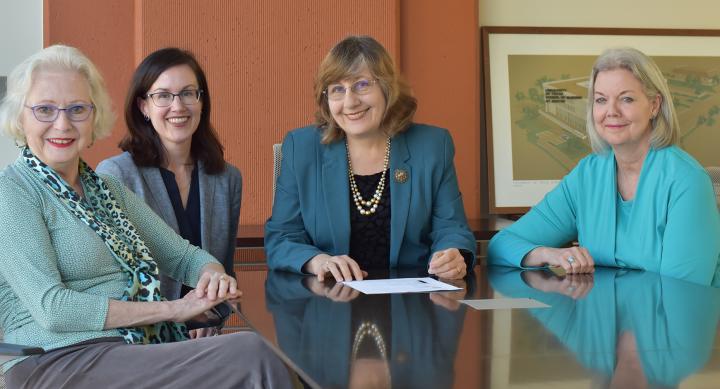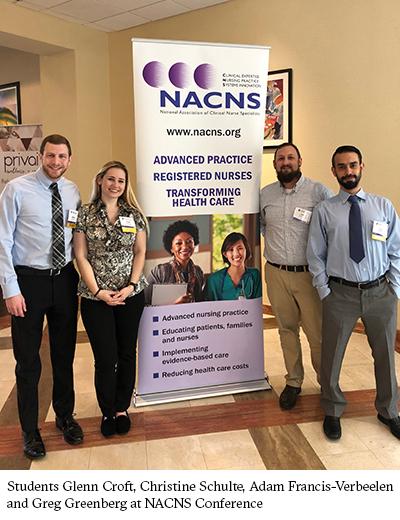
When Christina Schulte worked as a neuroscience researcher she could often go eight hours a day without speaking to another person, which was one reason she decided bench science wasn’t for her and decided to explore a career in nursing. Today, she is completing a Master of Science in Nursing degree with an Adult-Gerontology Clinical Nurse Specialist (AG CNS) concentration at the UT Austin School of Nursing.
“In nursing, I found there are so many different directions you can go,” she said. “In particular, clinical nurse specialists have a variety of areas they can work in, such as improving health care processes that in turn improve patient care and save hospitals money, or they can focus on chronic illnesses, such as cardiopulmonary, which is what I’m pursuing.”
As important and versatile as it is, the role of the CNS hasn’t always been well understood, even by hospital and clinic administrators.
“It’s a complex and varied role that can be hard to define,” said Gayle Timmerman, PhD, RN, CNS, FNAP, FAAN and associate dean for Academic Affairs, “but that’s what makes it wonderful and challenging and rich. The advanced practice nursing role of the CNS requires two scopes of practice — nursing and medicine. Our CNS program educates students to work both directly with patients with complex problems and also with other nurses to improve nursing practice such as reducing infection rates on the unit.
“In the organizational sphere, a CNS is often in the role of initiating practice change and innovation at the system level, which can have a huge ripple effect of improving quality of care. CNSs have competencies that span from direct patient care to organizational change. That’s a valuable knowledge base,” she added.
As advanced practice nurses (APNs), clinical nurse specialists provide diagnosis, treatment and ongoing management of patients. In some states, including Texas, CNSs have prescriptive authority. The UT Austin program includes clinical experiences in health promotion and the management of acute and chronic illness with a focus on theory and evidence-based practice. Most CNS graduates are employed as advanced practice CNSs in a variety of specialty practices, such as endocrinology, gerontology, neurology and cardiology.
“The UT Austin program began in 1996 and has educated hundreds of students who have gone on to work in a variety of environments,” said Angela Clark, PhD, APRN, ACNS-BC, FAAN, FAHA, FCNS and associate professor emerita. “We have one of the largest programs in the country and have always been a little ahead of national trends. For instance, we had already incorporated gerontology into our curriculum and clinical CNS courses before national organizations, who regulate and certify APRNs, called for it to be added as a requirement for all CNS and NP programs that prepare adult APRNs. Thus, the adult-gerontology CNS came into being.”
In addition to establishing a successful CNS program, the UT Austin faculty has contributed to the leadership of the National Association for Clinical Nurse Specialists (NACNS), the national organization for the CNS role.
“Two of us, Dr. Sharon Horner and I, have served as president. Dr. Timmerman has served on the Board of Directors, and Dr. Glenda Joiner-Rogers and Dr. Carol Delville served as program chairs for the national conference in 2018,” Dr. Clark said. “Leadership at the national board level includes major health policy development, requiring negotiation with leaders in other organizations on a variety of issues that affect APNs and the CNS role.”

This year, the NACNS began honoring members as Fellows of the organization, based on leadership with national impact and significant contributions as a CNS to health care and nursing practice. Faculty member Dr. Heather Cuevas and Dr. Clark were among 38 people selected for the inaugural cohort. Dr. Cuevas is also a clinician at the UT Austin School of Nursing’s Family Wellness Clinic working with individuals with diabetes following years of work as a CNS at Texas Diabetes and Endocrinology.
Student Glenn Croft, Gregory Greenberg and Christine Schulte also attended this year’s national NACNS conference to present an hour-long clinical management lecture on “Guidelines for Treatment of Hypertension: 2018 Update with a Focus on Salt Sensitivity.”
“I loved seeing how well our AG CNS students presented and how well they knew the research,” Dr. Cuevas said. “The audience was very engaged and impressed by the information.”
School of Nursing faculty have also played a major part in the Texas Clinical Nurse Specialist Association, with both Dr. Clark and Dr. Horner serving as president, and Dr. Cuevas as president-elect.
“What I think is particularly valuable is the leadership the School of Nursing has delivered to the nation by developing such a successful program,” Dean Stuifbergen said. “Our students graduate with knowledge of adult health illness conditions and how best to provide the care these individuals need in order to enjoy a better quality of life.”
“Being a CNS lets you be the expert,” Dr. Cuevas said. “It’s a role that allows you to do just about anything.”